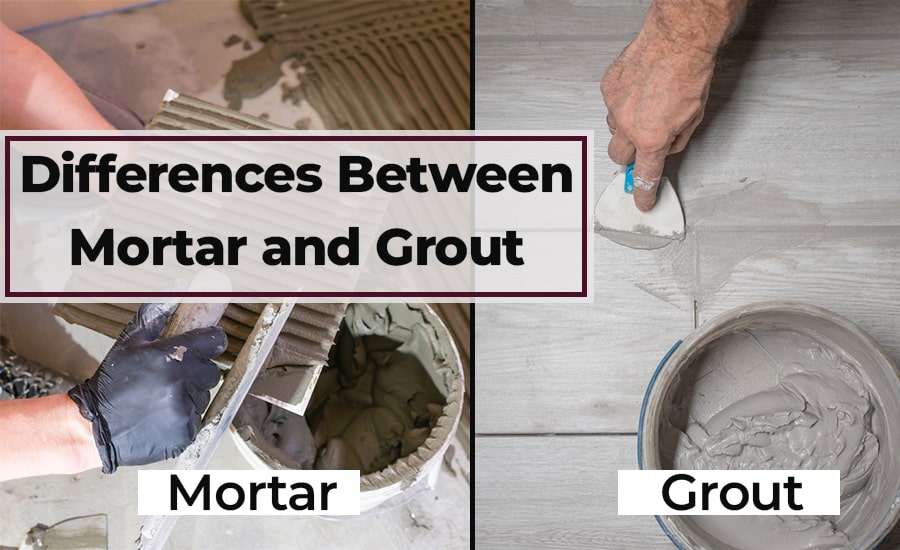Mortar and grout are two distinct compounds that are widely used in the construction industry for bricklaying and tile installation. Both mortar and grout are made of cement.
Despite the fact that cement is a foundation material in both mortar and grout, they have different qualities and applications.
The primary difference between mortar and grout is the amount of water in each. Because mortar contains less water than grout, it is stiffer than grout. When compared to mortar, grout is more fluid.
Mortar
Mortar is a cement-based compound that is often prepared in a semi-solid or paste state. It is composed of components such as cement, sand, water, and, at times, lime.
Lime is mixed into the mortar with other components to improve the structure’s durability and the binding strength between two nearby masonry portions.
Mortar also serves as a binding agent for masonry elements such as bricks, blocks, and stones. It can hold together bricks, blocks, and stones to form an element or any structure, such as walls.
A trowel is used to apply mortar between the masonry pieces. Mortar is sometimes utilized as a tile bedding material. Mortar is more rigid than grout. Because the amount of water in mortar is less than that in the grout.
As a result, mortar has less fluidity or flowability than grout. Mortar is usually mixed on-site to meet the requirements of the project.
There are numerous types of mortars, including:
Cement mortar.
Lime-cement mortar.
Lime mortar.
Mud mortar.
Cement, clay mortar, etc.
Each of them has unique properties and is utilized for different purposes.
Grout
Grout, like mortar, is a cement-based substance. Grout can also be found in semi-solid or paste form due to the presence of water as an ingredient. Grout is a filler substance used to fill gaps or grooves between tiles.
Grout is a viscous substance. The fluidity, or capacity to flow, of grout is greater than that of mortar. This is because the amount of water in the grout is comparatively higher.
Grout is less stiff than mortar and has a far higher fluidity than mortar. Because of the great fluidity of grout, trowel placement is not possible.
A few factors influence grout choices, including
The kinds of tiles.
Tile measurements
The width of the groove or the distance between the tiles (usually measured in millimeters).
The location of tile installation.
Climate conditions.
In addition to cement-based grouts, epoxy- and resin-based grouts are available. Different varieties of grouts are utilized depending on the above-mentioned factors, as well as their compatibility with the type of mortar used as a bedding material.
Grout, unlike mortar, comes in a variety of colors, tints, and finishes. Decorative grouts, such as matte-polished grout and glitter grout, are now available in a variety of shades on the market.
What Is the Difference Between Mortar and Grout? | Mortar Vs Grout
| Mortar | Grout |
|---|---|
| Mortar is manufactured out of cement, sand, water, and lime. | Grout is made of cement, water, sand, epoxy, acrylic, and polymer. |
| Mortar contains less water. | Grout contains more water. |
| It’s a bonding agent for masonry blocks, stones, and bricks. | It’s used to fill in gaps between tiles. |
| It is used as a bedding material beneath the tiles. | It is used to fill gaps between tiles as a filler substance. |
| Mortar is typically more rigid than grout. | Grout is softer than mortar. |
| The viscosity of mortar is low. | Grout is a very viscous substance. |
| A trowel is used to apply mortar. | A trowel cannot be used to apply grout. |
| The mortar’s fluidity is low. | The grout has higher fluidity. |
| When the mortar hardens, it must be cured. | There is no need for curing the grout. |
| It is typically found in the colour cement. | It is typically found in the color cement. |
| The mortar setting time is substantially longer. | Grout has a rather short setting time. |
| The workability of mortar is substantially higher since it can be simply applied with a trowel. | Because grout has low workability, it is difficult to apply with a trowel. |
| When it hardens, it becomes a non-porous material. It does not allow water to pass through and does not hold water. | Grout is a porous substance. Even in its toughened form, it may allow water to travel through while also holding water. |
Conclusion
Both mortar and grout come in a variety of colors and textures, so it is essential to choose the correct product for the intended purpose. Consult a professional or the manufacturer for guidance on which product is best.

